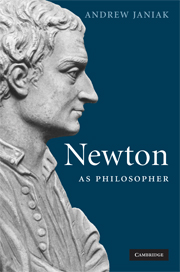Book contents
- Frontmatter
- Contents
- Preface
- Note on texts and translations
- 1 Newton as philosopher, the very idea
- 2 Physics and metaphysics: three interpretations
- 3 Do forces exist? contesting the mechanical philosophy, I
- 4 Matter and mechanism: contesting the mechanical philosophy, II
- 5 Space in physics and metaphysics: contra Descartes
- 6 God and natural philosophy
- Bibliography
- Index
4 - Matter and mechanism: contesting the mechanical philosophy, II
Published online by Cambridge University Press: 22 September 2009
- Frontmatter
- Contents
- Preface
- Note on texts and translations
- 1 Newton as philosopher, the very idea
- 2 Physics and metaphysics: three interpretations
- 3 Do forces exist? contesting the mechanical philosophy, I
- 4 Matter and mechanism: contesting the mechanical philosophy, II
- 5 Space in physics and metaphysics: contra Descartes
- 6 God and natural philosophy
- Bibliography
- Index
Summary
We have seen that gravity is a physical quantity, although Newton remains ignorant of how it fits into the ontology that most of his interlocutors would accept. He is ignorant of whether gravity is a property, a mode, or something else entirely. Many of Newton's interlocutors – Leibniz most prominent among them – balked at this profession of ignorance, arguing that at best, he tacitly treats gravity as a property of all material bodies. From their point of view, Newton had thereby revived an aspect of late Scholastic natural philosophy that the mechanists had attempted to bury, the doctrine of occult qualities. Newton and the editor of the Principia's second edition, Roger Cotes, an astronomy professor at Trinity College Cambridge, attempted to rebut this charge, adding an extensive preface by Cotes in which he ridicules Newton's critics. However, determining the proper response to this criticism broke the ranks of the Newtonians. Cotes insisted that gravity was a primary quality like any other, not occult but manifest. Newton resisted that response, avoiding the contention that gravity was any type of quality.
Newton's response to Leibniz's criticism required a delicate balancing act: he proclaimed explicitly that all bodies in the universe “gravitate” towards one another, even while denying that he took gravity to be a quality of bodies. As we saw briefly in the last chapter, we can understand this subtle view only if we recognize that mass, rather than gravity, is the new quality discovered in the Principia.
- Type
- Chapter
- Information
- Newton as Philosopher , pp. 87 - 129Publisher: Cambridge University PressPrint publication year: 2008

